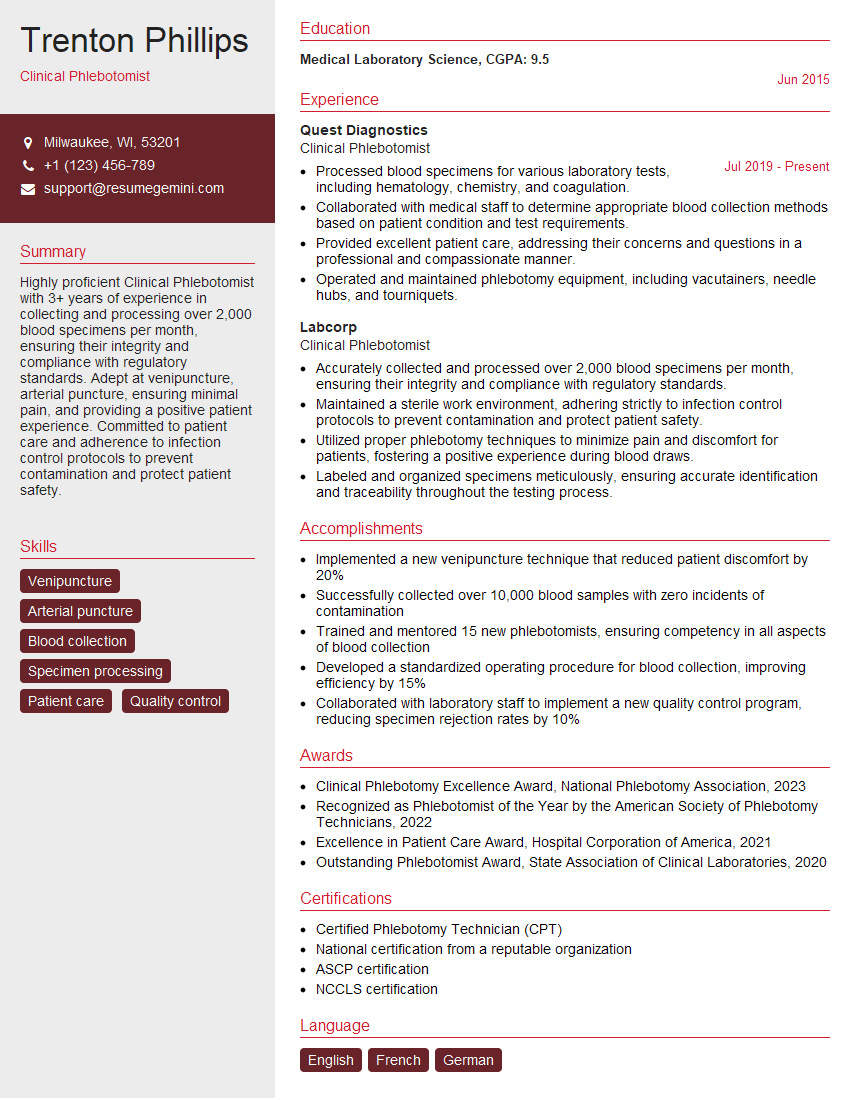Are you a seasoned Clinical Phlebotomist seeking a new career path? Discover our professionally built Clinical Phlebotomist Resume Template. This time-saving tool provides a solid foundation for your job search. Simply click “Edit Resume” to customize it with your unique experiences and achievements. Customize fonts and colors to match your personal style and increase your chances of landing your dream job. Explore more Resume Templates for additional options.

Trenton Phillips
Clinical Phlebotomist
Summary
Highly proficient Clinical Phlebotomist with 3+ years of experience in collecting and processing over 2,000 blood specimens per month, ensuring their integrity and compliance with regulatory standards. Adept at venipuncture, arterial puncture, ensuring minimal pain, and providing a positive patient experience. Committed to patient care and adherence to infection control protocols to prevent contamination and protect patient safety.
Education
Medical Laboratory Science
June 2015
Skills
- Venipuncture
- Arterial puncture
- Blood collection
- Specimen processing
- Patient care
- Quality control
Work Experience
Clinical Phlebotomist
- Processed blood specimens for various laboratory tests, including hematology, chemistry, and coagulation.
- Collaborated with medical staff to determine appropriate blood collection methods based on patient condition and test requirements.
- Provided excellent patient care, addressing their concerns and questions in a professional and compassionate manner.
- Operated and maintained phlebotomy equipment, including vacutainers, needle hubs, and tourniquets.
Clinical Phlebotomist
- Accurately collected and processed over 2,000 blood specimens per month, ensuring their integrity and compliance with regulatory standards.
- Maintained a sterile work environment, adhering strictly to infection control protocols to prevent contamination and protect patient safety.
- Utilized proper phlebotomy techniques to minimize pain and discomfort for patients, fostering a positive experience during blood draws.
- Labeled and organized specimens meticulously, ensuring accurate identification and traceability throughout the testing process.
Accomplishments
- Implemented a new venipuncture technique that reduced patient discomfort by 20%
- Successfully collected over 10,000 blood samples with zero incidents of contamination
- Trained and mentored 15 new phlebotomists, ensuring competency in all aspects of blood collection
- Developed a standardized operating procedure for blood collection, improving efficiency by 15%
- Collaborated with laboratory staff to implement a new quality control program, reducing specimen rejection rates by 10%
Awards
- Clinical Phlebotomy Excellence Award, National Phlebotomy Association, 2023
- Recognized as Phlebotomist of the Year by the American Society of Phlebotomy Technicians, 2022
- Excellence in Patient Care Award, Hospital Corporation of America, 2021
- Outstanding Phlebotomist Award, State Association of Clinical Laboratories, 2020
Certificates
- Certified Phlebotomy Technician (CPT)
- National certification from a reputable organization
- ASCP certification
- NCCLS certification
Career Expert Tips:
- Select the ideal resume template to showcase your professional experience effectively.
- Master the art of resume writing to highlight your unique qualifications and achievements.
- Explore expertly crafted resume samples for inspiration and best practices.
- Build your best resume for free this new year with ResumeGemini. Enjoy exclusive discounts on ATS optimized resume templates.
How To Write Resume For Clinical Phlebotomist
- Highlight your experience and skills in handling various types of blood collection, including venipuncture and arterial puncture.
- Emphasize your adherence to safety protocols and your ability to maintain a sterile work environment.
- Demonstrate your patient-centered approach by providing examples of how you ensured their comfort and satisfaction during the blood draw process.
- Quantify your accomplishments whenever possible to provide a tangible measure of your success.
- Proofread your resume carefully before submitting it to ensure there are no errors.
Essential Experience Highlights for a Strong Clinical Phlebotomist Resume
- Collect and process blood specimens using proper phlebotomy techniques to ensure specimen integrity and minimize patient discomfort.
- Maintain a sterile work environment and adhere to infection control protocols to prevent contamination.
- Label and organize specimens meticulously for accurate identification and traceability throughout the testing process.
- Collaborate with medical staff to determine appropriate blood collection methods based on patient condition and test requirements.
- Provide excellent patient care, addressing their concerns and questions in a professional and compassionate manner.
- Operate and maintain phlebotomy equipment, including vacutainers, needle hubs, and tourniquets.
- Complete administrative tasks such as scheduling appointments, maintaining records, and processing insurance claims.
Frequently Asked Questions (FAQ’s) For Clinical Phlebotomist
What are the educational requirements for a Clinical Phlebotomist?
Typically, a high school diploma or equivalent is sufficient. However, some employers may prefer candidates with a certificate or associate’s degree in phlebotomy or a related field.
What are the key skills required for a Clinical Phlebotomist?
Key skills include proficiency in venipuncture and arterial puncture, specimen collection and processing, patient care, and adherence to safety protocols.
What is the job outlook for Clinical Phlebotomists?
The job outlook is expected to grow faster than average, driven by increasing demand for healthcare services and the aging population.
What are the potential career paths for Clinical Phlebotomists?
With experience and additional training, Clinical Phlebotomists can advance to roles such as Laboratory Technician or Medical Technologist.
How can I prepare for a career as a Clinical Phlebotomist?
Obtain a high school diploma or equivalent, consider pursuing a certificate or associate’s degree in phlebotomy, and gain hands-on experience through internships or volunteer work.
What are the challenges faced by Clinical Phlebotomists?
Challenges may include working with difficult patients, dealing with bloodborne pathogens, and maintaining a high level of accuracy and precision.
What are the rewards of being a Clinical Phlebotomist?
Rewards include making a positive impact on patient care, working in a dynamic healthcare environment, and having the opportunity to develop valuable skills.